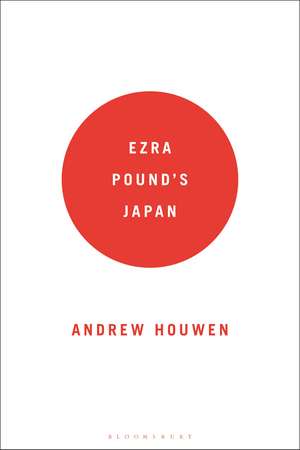Ezra Pound's Japan
Autor Andrew Houwenen Limba Engleză Paperback – 21 sep 2022
| Toate formatele și edițiile | Preț | Express |
|---|---|---|
| Paperback (1) | 198.74 lei 6-8 săpt. | |
| Bloomsbury Publishing – 21 sep 2022 | 198.74 lei 6-8 săpt. | |
| Hardback (1) | 569.94 lei 6-8 săpt. | |
| Bloomsbury Publishing – 24 mar 2021 | 569.94 lei 6-8 săpt. |
Preț: 198.74 lei
Preț vechi: 258.39 lei
-23% Nou
Puncte Express: 298
Preț estimativ în valută:
38.03€ • 39.29$ • 31.64£
38.03€ • 39.29$ • 31.64£
Carte tipărită la comandă
Livrare economică 20 martie-03 aprilie
Preluare comenzi: 021 569.72.76
Specificații
ISBN-13: 9781350216808
ISBN-10: 1350216801
Pagini: 280
Dimensiuni: 156 x 234 x 18 mm
Greutate: 0.39 kg
Editura: Bloomsbury Publishing
Colecția Bloomsbury Academic
Locul publicării:London, United Kingdom
ISBN-10: 1350216801
Pagini: 280
Dimensiuni: 156 x 234 x 18 mm
Greutate: 0.39 kg
Editura: Bloomsbury Publishing
Colecția Bloomsbury Academic
Locul publicării:London, United Kingdom
Caracteristici
Features significant original research on Pound's Japanese friendships that enriched his understanding of Japanese literature
Notă biografică
Andrew Houwen is Associate Professor at Tokyo Woman's Christian University, Japan.
Cuprins
AcknowledgementsAbbreviationsNote on the Text Introduction 1 Ezra Pound's Japan Part 1: Pound and Hokku 2 Herbert Spencer's 'Minor Image', Masaoka Shiki, and the Meiji Reinvention of Haiku3 Symphonies in White: Basil Hall Chamberlain and the Introduction of 'Hokku' into English4 Pound's '"Metro" Hokku' Part 2: Pound and No 5 'Nobody Thought No Would Rise Again': Umewaka Minoru and the Meiji Revival of No6 Ernest Fenollosa's 'Single Image' and the Introduction of No into English7 'One of the Great Arts of the World': Pound's First No Translations8 'Growing Together': Pound's Japanese Friends, No, and the Genesis of The Cantos 9 'The Closest Parallel to My Thought': Pound's No Plays and Accomplishments Part 3: No and The Cantos 10 'Grow with the Pines of Ise': Pound's Early Cantos and No11 'A Treasure Like Nothing We Have in the Occident': Pound's Wartime Cantos and No12 'The Light Sings Eternal': No's Place in the Paradiso of Pound's Later Cantos BibliographyIndex of (Published) Works by PoundIndex of Names
Recenzii
A detailed, thorough, complete and successful account of Pound's encounter with Japan rooted in primary sources. The book enlarges our understanding of Pound and Noh, 'Hokku' and Fenollosa not only in relation to The Cantos but to Pound's entire literary universe.
Ezra Pound's Japan gives readers a comprehensive and deeply learned account of the crucial, lifelong influence of Japanese poetry, drama, and friendship on Pound's poetics. Andrew Houwen argues that Pound's early experiments with Hokku were anything but mere poetic effect, instead realizing a genre first rejuvenated in the Meiji era and then subject to intensive translation in the later nineteenth century. Houwen draws on a range of historical material before and during Pound's Modernist moment and pays close attention to theories of poetics and translation, providing the definitive account of this most popular of Japanese forms and its entry into Anglophone poetics. Equally, the revival of no (?) in the Meiji era and its transformative effect on Modernist poetics is a familiar story, but in his careful reading of no texts such as Hagoromo, Aoi no ue, Kagekiyo, Kumasaka, and Genji, and their role in the development of Pound's Cantos, Houwen offers a foundational corrective to scholarly dismissal of this dramatic form on Pound's later poetics. Instead, such key images as the twin pines of Hagoromo function within Pound's text as structural principles, methods of orienting the wide range of historical and literary sources from the ur-Cantos of 1917 to the last glimpses of paradiso in Drafts & Fragments. This book gives sensitive account of existing scholarship and charts the full significance of Japanese literature in Pound's poetic career: it will be the standard reference for some time.
Ezra Pound's Japan gives readers a comprehensive and deeply learned account of the crucial, lifelong influence of Japanese poetry, drama, and friendship on Pound's poetics. Andrew Houwen argues that Pound's early experiments with Hokku were anything but mere poetic effect, instead realizing a genre first rejuvenated in the Meiji era and then subject to intensive translation in the later nineteenth century. Houwen draws on a range of historical material before and during Pound's Modernist moment and pays close attention to theories of poetics and translation, providing the definitive account of this most popular of Japanese forms and its entry into Anglophone poetics. Equally, the revival of no (?) in the Meiji era and its transformative effect on Modernist poetics is a familiar story, but in his careful reading of no texts such as Hagoromo, Aoi no ue, Kagekiyo, Kumasaka, and Genji, and their role in the development of Pound's Cantos, Houwen offers a foundational corrective to scholarly dismissal of this dramatic form on Pound's later poetics. Instead, such key images as the twin pines of Hagoromo function within Pound's text as structural principles, methods of orienting the wide range of historical and literary sources from the ur-Cantos of 1917 to the last glimpses of paradiso in Drafts & Fragments. This book gives sensitive account of existing scholarship and charts the full significance of Japanese literature in Pound's poetic career: it will be the standard reference for some time.
